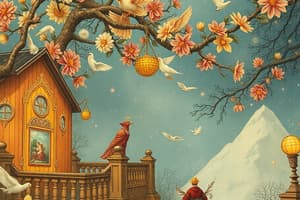Podcast
Questions and Answers
Which literary device uses the words 'like' or 'as' to compare two things?
Which literary device uses the words 'like' or 'as' to compare two things?
- Onomatopoeia
- Simile (correct)
- Hyperbole
- Alliteration
In the phrase 'Peter Piper picked a peck of pickled peppers,' what literary device is being used?
In the phrase 'Peter Piper picked a peck of pickled peppers,' what literary device is being used?
- Alliteration (correct)
- Hyperbole
- Simile
- Onomatopoeia
Which literary device involves the use of extreme or extravagant statements?
Which literary device involves the use of extreme or extravagant statements?
- Onomatopoeia
- Personification
- Alliteration
- Hyperbole (correct)
Which literary device is exemplified by the phrase 'the wind howls like a hundred wolves'?
Which literary device is exemplified by the phrase 'the wind howls like a hundred wolves'?
Which literary device is characterized by words that mimic sounds, allowing readers to 'hear' the words they're reading?
Which literary device is characterized by words that mimic sounds, allowing readers to 'hear' the words they're reading?
What literary device is being described as the 'brushes in an artist's palette' and 'instruments in a musician's symphony'?
What literary device is being described as the 'brushes in an artist's palette' and 'instruments in a musician's symphony'?
Which literary device uses exaggerated statements like 'never' and 'always' to add emphasis and humor?
Which literary device uses exaggerated statements like 'never' and 'always' to add emphasis and humor?
Which literary device adds layers of meaning and emotion to stories by attributing human-like qualities to non-human entities?
Which literary device adds layers of meaning and emotion to stories by attributing human-like qualities to non-human entities?
Flashcards are hidden until you start studying
Study Notes
English 101: Unleashing Literal Magic with Simile, Alliteration, Hyperbole, and Onomatopoeia
Imagine you're reading a tale where the moon beams like diamonds, the wind howls like a hundred wolves, and a character's eyes sparkle like stars. You've just encountered the marvelous world of literary devices, more specifically: simile, alliteration, hyperbole, and onomatopoeia.
Simile: The Art of Comparison
Similes are phrases that use the words "like" or "as" to compare two things, making them an effective way to help readers visualize or understand an idea more clearly. For instance, the wind "howls like a hundred wolves" weaves together the sounds of the wind and the howl of wolves into a vivid image in the reader's mind.
Alliteration: The Power of Repeating Sounds
Alliteration is the use of the same initial sounds in consecutive or closely placed words. This technique can be found in names, such as Peter Piper picked a peck of pickled peppers, where the repetition of the "P" sound emphasizes the rhythm and flow of the sentence. Alliteration can also be found in phrases like "sinister streets" or "lively lizards," where the repetition of sounds adds musicality and tone to the writing.
Hyperbole: The Art of Exaggeration
Hyperbole is the use of extreme or extravagant statements not meant to be taken literally. Words like "never," "always," or "entirely" can be used to create hyperbolic statements, such as "I'm never hungry" or "I always make the perfect cup of tea." Hyperbole is a great way to add emphasis and humor to writing.
Onomatopoeia: The Language of Sound
Onomatopoeia is the use of words that mimic sounds, allowing readers to "hear" the words they're reading. For example, "meow" for a cat, "quack" for a duck, or "buzz" for a bee. While this technique isn't as common in literary writing, onomatopoeia can create a sense of connection or immersion, especially when used in dialogue or descriptive writing.
These literary devices are not just tools; they're the brushes in an artist's palette, the instruments in a musician's symphony. They bring texture to words, adding layers of meaning and emotion to the stories we read or tell. The next time you pick up a book, listen for the echo of the wind howling through the trees, or marvel at the moon shining like a diamond. These literary devices are the keys to unlocking the hidden beauty of words. provided no direct information relevant to the topic of English 10-2 literary terms.
Studying That Suits You
Use AI to generate personalized quizzes and flashcards to suit your learning preferences.




